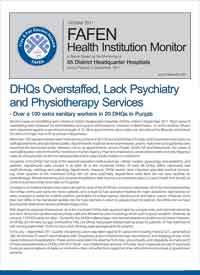A Report Based on the Monitoring of 129 Police Stations in 74 Districts across Pakistan during July-September 2011
ISLAMABAD, November 27: A Free and Fair Election Network (FAFEN) report on Sunday said monitoring of 129 police stations from July to September 2011 this year across Pakistan showed misuse of authority and cases of graft denting public trust in police.
The report said a large number of police stations were not providing services perhaps due to low, and in some cases, non-existent official oversight mechanisms.
FAFEN governance monitors visited 70 police stations in 32 districts in Punjab, 29 in 16 districts in Sindh, 16 in 12 districts in Khyber Pakhtunkhwa and 14 in as many districts in Balochistan from July to September this year.
People at 22 police stations complained the police sought monetary benefits from them for registering FIRs while at 23 they complained of police seeking non-monetary benefits.
Complaints of misuse of authority and bribery were reported in at least 10% of the police stations. At 15 police stations, the police were observed to be turning away citizens at the gate. Relatives of inmates at 13 police stations complained of detention without charges while at 21 police stations they complained the police were seeking bribes to release the inmates. Complaints of police torturing inmates were received from 24 of the monitored police stations.
While all police stations have been provided vehicles and nearly all have been provided fuel as well, several Station House Officers (SHOs) complained of their unavailability. This may explain the fact that people at 22 police stations complained the Investigating Officers (IOs) sought logistic support from them for investigating their cases.
The SHOs at 16 police stations showed their dissatisfaction over the quality and amount of government support they were receiving. The SHOs’ list of grievances included lack of physical infrastructure, logistic support, human resources, funds along with low salaries and fringe benefits, strenuous duty hours and political interventions impeding performance of police stations.
As pointed out by SHOs, physical infrastructure was found to be lacking in the monitored police stations – 25 were not housed in proper buildings and another 50 were operating out of buildings in dilapidated condition. Thirty-six of the monitored police stations did not have the necessary stationery for registering FIRs while 14 did not have telephones/wireless connections. There were no lavatories for inmates at 18 of the monitored police stations while the condition of lockups at 51 of them was not satisfactory. The occupancy rate of the male and female sanctioned posts was found to be 82% and 83% respectively.
Regarding the implementation of the Access to Information Policy adopted by the Sindh and Punjab governments in 2006 and 2007 respectively, it was observed that 41 police stations in Punjab and 18 in Sindh did not maintain a separate register for recording access to information requests. An Information Access Officer was also not designated at 38 police stations in Punjab and 18 in Sindh.
In more than half (55) of the monitored police stations, copies of challans to the court were not made accessible to the public. However, the situation with respect to the FIRs was better and the public had access to them in 80 of the 99 monitored police stations.
The issues observed in the police stations monitored during the quarter can be directly related to the low government oversight by the public and elected officials. Only 51 visits were made by top officials to 129 police stations monitored nationwide.
About FAFEN: FAFEN is a network of 42 civil society organizations working to foster democratic accountabilities in Pakistan. It is governed by the Trust for Democratic Education and Accountability.


